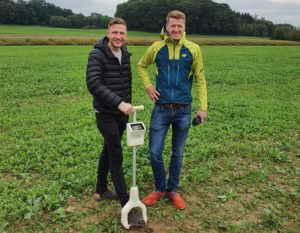The Berlin-based startup Stenon has set itself the goal of revolutionising soil analysis. The new “FarmLab” device has been developed to directly analyse the most common soil parameters in the field, without any need for the time-consuming and lengthy examination of soil samples in the laboratory. The Agro Innovation Lab has been testing the device in practical situations together with partners during the past few months.

Since 2020, digitalisation and IoT have been among the main focuses of the Agro Innovation Lab. Hence, we’re constantly on the lookout for new sensor technologies for agriculture and repeatedly test the use and benefits of such systems in our pilot projects. For example, we’ve been following the activities of the Stenon company and its “FarmLab” device for some time. The measuring spade permits the real-time analysis of a multitude of soil parameters by means of infrared spectroscopy and both optical and electrochemical measurement. This enables results for not only the main nutrients (N, P and K), but also humus content and soil moisture to be determined on the spot and documented in a geo-referenced form.
The aim of the practical test, which we carried out together with three selected Lagerhaus cooperatives, was to evaluate potential new soil analysis services for farmers. For example, we considered developing a rental or service model as a means of complementing our existing soil sampling service. Since 2015, we’ve been on the road with our two special vehicles on behalf of the Lagerhaus cooperatives, taking precision soil samples in fields, meadows and vineyards as a basis for location-specific fertilisation. Another partner in the project was Innovation Farm in Wieselburg, which compared measurements from the Stenon “FarmLab” with those generated by the traditional analytical methods used by accredited laboratories.
But how exactly does this novel method of soil analysis work?
After the measuring spade has been calibrated with a special cap, it’s ready for use and measurement can begin. Three punctures in the immediate vicinity are necessary for each measuring point. The device can either temporarily store the collected data or, with an active WLAN connection, load it directly into the Stenon Cloud, where the analysis and evaluation of the measurement data takes place. For this purpose, thousands of soil samples were taken by the manufacturer, evaluated in various accredited laboratories and compared with the results of the “FarmLab”. The data is made available to users in a user-friendly platform. This web portal can be easily accessed from mobile devices and desktops and permits the creation of application maps based on measured soil parameters.
After three months of testing, farmers spoke particularly highly of the simple and self-explanatory user interface of the device and the efficient data transfer and evaluation in the web application. Some individual customers, however, had difficulty using the software. The robust design of the “FarmLab” was able to convince all participants in the test. The lack of official recognition of the analysis results was criticised. Despite the fact that the device is now DLG certified, the analysis reports cannot yet be submitted to the authorities. This is certainly the biggest obstacle to this new development by the Stenon company. The project participants would also have preferred the nutrient contents to be automatically classified into the official content classes in order to obtain a quick overview of the condition of the sampled soil.
The decision as to whether this development will now be offered as a service to farmers together with the Lagerhaus cooperatives is still pending and will be evaluated internally in the coming weeks. We will keep you posted.
Photo: AIL
